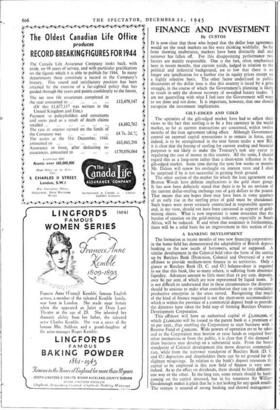FINANCE AND INVESTMENT
By CUSTOS
IT is now clear that those who hoped that the dollar loan agreement would set the stock markets on fire were thinking wishfully. So far from showing exuberance, markets have been distinctly dull and turnover has fallen off. For this disappointing performance two factors are mainly responsible. One is the fact, often emphasised here in recent months, that current yields, judged in relation to the political and industrial background, are so low that there is no longer any justification for a further rise in equity prices except on a highly selective basis. The other factor underlined in public discussions of the dollar loan is that this country is faced by a grim struggle, in the course of which the Government's planning is likely to result in only the slowest recovery of so-called luxury trades. I am not quarrelling with what I feel sure the Government will want to see done and not done. It is important, however, that one should recognise the investment implications.
GILT-EDGED AND GOLD The optimists of the gilt-edged market have had to adjust their views to the fact that sterling is to be a free currency in the world market, so far as current transactions are concerned, within twelve months of the loan agreement taking effect. Although Government control on external capital transactions is to remain in force, and, indeed, is to be strengthened in the near future under a new Bill, it is clear that the freeing of sterling for current trading and financial purposes is not likely to make the Treasury's task any easier in regulating the cost of money in this country. All the same, I should regard this as a long-term rather than a short-term influence in the gilt-edged market. Some time during the next few, weeks or months Mr. Dalton will renew his onslaught on interest rates and I shall be surprised if he is not successful in gaining fresh ground.
The other section of the market for which the loan agreement and Bretton Woods have definite implications is the gold share group. It has now been definitely stated that there is to be no revision of the current dollar-sterling exchange rate of 4.03 dollars to the pound. That means that any hopes there may have been in some quarters of an early rise m the sterling price of gold must be abandoned. Such hopes were never seriously entertained in responsible quarters and, in my view, should not have been canvassed in support of gold- mining shares. What is now important is some assurance that the burden of taxation on the gold-mining industry, especially in South Africa, will be reduced. If and when that assurance is forthcoming, there will be a solid basis for an improvement in this section of the
A BANKING DEVELOPMENT
The formation in recent months of two new financing corporations in the home field has demonstrated the adaptability of British deposit banking to the new needs of borrowers, actual or ,supposed. A similar development in the Colonial field takes the form of the setting up by Barclays Bank (Dominion, Colonial and Overseas) of a new offshoot to provide medium-term finance in its territories. Only a glance at Barclays Bank (D. C. and 0.) balance-sheet is required to see that this bank, like so many others, is suffering from abnormal liquidity. Advances amount to little more than it per cent. deposits, over 8o per cent. of which are now represented by liquid items. It is not difficult to understand that in these circumstances the directors should be anxious to make what contribution they can to stimulating productive enterprise in the areas served. Recognising that much of the kind of finance required is not the short-term accommodation which is within the province of a commercial deposit bank to provide, the directors have taken the bold step of forming Barclays Overseas Development Corporation. This offshoot will have an authorised capital of £5,000,000, of which £1,000,000 will be issued to the parent bank at a premium of 5o per cent., thus enabling the Corporation to start business with a Reserve Fund of £5oci,000. Wide powers of operation are to be taken and as the Corporation may borrow or raise - funds as required-from other, institutions or from the public, it is clear that if the demand is there business may develop on a substantial scale. From the broad standpoint of Colonial development this move deserves commenda- tion, while from the narrower standpoint of Barclays Bank (D. C. and 0.) depositors and shareholders there can be no ground for the slightest misgivings. In relation to the bank's deposit resources tiv capital to be employed in this new field of finance is very small indeed. As to the effect on dividends, there should be little difference one way or the other. In the long run, some return should be forth- coming on the capital invested, but in his statement Sir William Goodenough makes it plain that he is not looking for any quick results. The venture is assured of strong backing and shrewd management.






























 Previous page
Previous page